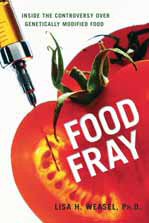SEJournal Online is the digital news magazine of the Society of Environmental Journalists. Learn more about SEJournal Online, including submission, subscription and advertising information.

BookShelf
Food Fray: Inside the Controversy over Genetically Modified Food
By Lisa Weasel
Amacom, $23
Reviewed by KATHLEEN REGAN
Genetically modified food: Is it Frankenfood or the key to solving world hunger?
Genetic manipulation of food, foodstuffs and seeds is almost always characterized in one of these ways but it is much more complex than its supporters or detractors would have us believe. It is a collection of sophisticated and rapidly changing technologies that intersect with huge profits and politics — a combination that should always raise ethical concerns.
Food Fray, by Lisa Weasel, a molecular biologist, is an attempt to clarify the controversy over genetically modified food. She is well positioned to understand and explain the science behind GMOs so their ethical, political and economic implications can be evaluated. But her purpose is to write about these implications as well as scientific aspects of the controversy.
Weasel recounts some of the miserable events that have led to the prevalence of GMOs in our food supply. For example, Monsanto has paid farmers in India to testify to the success of a genetically modified cotton plant that had already failed and harassed American farmers for ostensibly stealing GM seeds. These are only two examples in a long and disturbing list.
She recounts cases involving the misuse of GM technology to increase yields of products for which we already have a surplus and to secure private ownership of genetic innovations. She provides only a few examples of its application to solving problems, implying that these are not nearly enough to counteract its negative effects. Sadly, even when such applications exist, they are often hijacked for short-term profits, with the technology's humanitarian applications often falling by the wayside. There are also some hysterically funny (in retrospect) examples of failed GMO projects, like the Flavr Savr tomato. But Weasel's outraged tone often prejudices the stories when the facts alone would have done the job.
The strengths of this book, however, are twofold. First, Weasel's explanations of the science behind various approaches to genetic modification are clear and accessible to the non-scientist. Her explanation of the modification of plants for built-in resistance to herbicides or the injection of rBGH (recombinant bovine growth hormone), for example, are sophisticated enough to be meaningful but easily understood. Because there are so many types of genetic modification, these detailed explanations are valuable to the interested citizen. Second, Weasel gives a solid account of several grassroots movements that have developed in opposition to GMOs. She lets the activists trying to stand up to the giants of GMO industry speak for themselves. We learn just how they have been successful, what it took to achieve their goals and the struggles in which they still engage.
But in spite of her efforts, this is not an objective characterization of GMOs. She is clearly on one side of the issue and the book falters when she indulges in biased accounting. (For example, biotech scientists are "brash", while anti-GMO activists are "indefatigable.") There is nothing wrong with being on one side of an issue or another but one should be honest about where one stands. For an SEJer who reports on issues like GMOs that are contentious, complicated, confusing, and emotional, it is critical to remember the job of the journalist: to advance public understanding by providing information about issues in such a way that the public can make distinctions, make decisions or take action on those issues. Food Fray is worth reading and Weasel is a good writer. But for those of us who report on the environment, one lesson from this book — especially its first few strident chapters — is how not to write about contentious scientific issues.
Kathy Regan is a freelance writer based in Ludwigsburg, Germany. After nearly 20 years working in ecosystems research, she is now finishing a master's degree in environmental sustainability and food production.
** From the quarterly newsletter SEJournal Fall 2009 issue.












 Advertisement
Advertisement 



